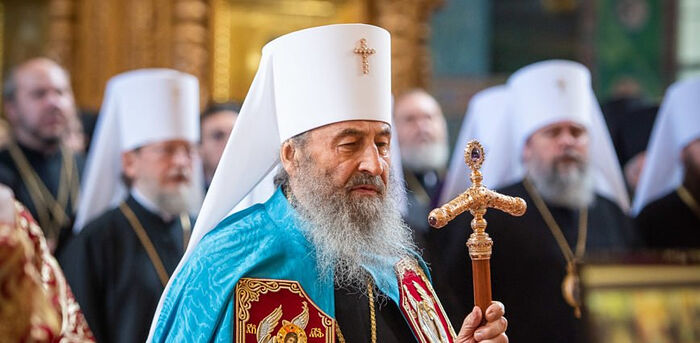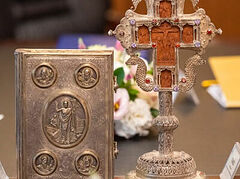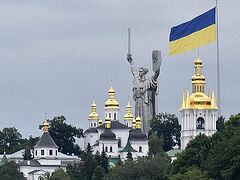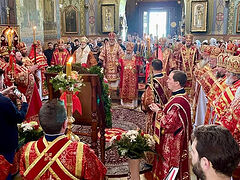Kiev, May 27, 2022
The Ukrainian Orthodox Church opened its meeting of hierarchs, clergy, monastics, and laity at St. Panteleimon’s Convent in Kiev this morning.
The day began with the celebration of the Divine Liturgy by His Beatitude Metropolitan Onuphry of Kiev and All Ukraine and a number of hierarchs and clerics of the Ukrainian Church.
The Ukrainian Holy Synod announced its plans to hold a meeting with representatives from all levels of Church membership on May 12, “to discuss the problems of Church life that arose as a result of the war.”
At that time, the Synod also cautioned that “the discussion on this or that issue should not lead to going beyond the canonical field and should not lead to new divisions in the Church of Christ.”
The Ukrainian primate opened the meeting today with an address in which he summarized the difficult life of the Ukrainian Orthodox Church during the time of the ongoing fratricidal war.
His Beatitude opened his address by recalling that exactly 30 years ago, on May 27, 1992, the UOC Council of Bishops gathered for the Kharkiv Council, the decisions of which “determined the further historical path of our Church,” preserving its unity and “protect[ing] it from the forces that tried to use the institution of the Church for their own purposes.” It was at the Kharkiv Council that Philaret Denisenko was defrocked and His Beatitude Metropolitan Vladimir (Sabodan) was elected to replace him.
Hard times have come for Ukraine, Met. Onuphry said:
The war started by the Russian Federation against Ukraine has been going on for more than three months. Military operations have already claimed thousands of lives of our compatriots, homes have been destroyed, families have been orphaned, and innocent people are suffering. All the consequences of the ongoing war can’t be described, just as it’s impossible to find words to convey all the pain of millions of Ukrainians. Not to lose our humanity and the image of God when evil has filled our hearts, not to be shaken in our faith in God—these are the most difficult tasks facing us now.
The Ukrainian Church has condemned the war from the very first day, Met. Onuphry recalled, though, “the voice of our Church unfortunately wasn’t heard.”
14 of 53 dioceses are particularly affected by fighting, more than 80 churches have been destroyed, and clerics, monastics, and laymen have been killed, the primate continued. And the Church has joined in the defense of Ukraine, opening the doors of its churches and monasteries for shelter, and offering comprehensive humanitarian assistance to Ukrainian servicemen, hospitals, civilians, and refugees. The Church has spent tens of thousands of dollars on ammunition, cars, and humanitarian aid for the army and military families.
And, of course, the Church continues to pray fervently for peace.
However, despite its stance, “religious hostility towards the Ukrainian Orthodox Church has artificially increased in society,” thanks to “representatives of other faiths, individual deputies, and civil servants” who “abuse their power,” His Beatitude laments. Such people make repeated illegal and baseless accusations against the Church.
Met. Onuphry specifically recalled the bill registered in the Verkhovna Rada on March 22 to completely ban the Ukrainian Orthodox Church and nationalize all its property. Additionally, more than 20 local self-government bodies and officials have illegally banned or restricted the Church in their areas. More than 40 raider seizures and more than 15 cases of confrontations and the sealing of churches have been recorded. 50 parishes have been forced into the schismatic “Orthodox Church of Ukraine,” the Ukrainian primate announced.
Despite repeated accusations, no signs of anti-state activity have been found within any Ukrainian Orthodox parishes. “However, this doesn’t stop people who are far from the Church from continuing to conduct an open anti-Church campaign,” Met. Onuphry continued. Thanks to this campaign, “Ukrainians are divided into ‘us’ and ‘them.’”
“The most painful thing is that crimes against Ukrainians belonging to the Ukrainian Orthodox Church are committed by Ukrainians.”
Letters have been sent to the Ukrainian Prosecutor General and the Verkhovna Rada Commissioner for Human Rights in defense of the Ukrainian Church and its communities, and criminal and administrative cases have been opened in many dioceses against people who have committed offenses.
“We will continue to protect our rights in legal ways,” His Beatitude assured.
And despite all its trials and tribulations, the Ukrainian Orthodox Church will stand strong and endure, Met. Onuphry believes:
The historical path of the Church is the way of the Cross of Christ the Savior. And in the past, they tried to make the clergy and faithful out to be enemies of the state, and the Church was blamed for various activities uncharacteristic of it. However, those who fought with the Church have long since passed away, and the Church of Christ has persevered and continues to carry out its saving mission, because the Church is the Body of Christ. We believe that in modern conditions the Ukrainian Orthodox Church, like our entire Ukrainian state, will survive and win.
In conclusion, His Beatitude set the stage for the day’s discussions:
The problems of recent years, as well as the new challenges that have now arisen due to the military operations on the territory of Ukraine, prompted us to gather in this holy monastery to discuss them and express our views and suggestions.
I would like to wish all of us fruitful work for the glory of God in the spirit of love, fraternal trust, and mutual respect.
Follow OrthoChristian on Twitter, Vkontakte, Telegram, WhatsApp, MeWe, and Gab!





